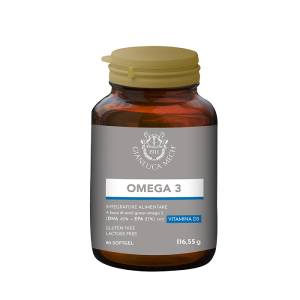Benefits of Omega 3 During Menopause
Did you know that there is a type of fat called Unsaturated, which, in addition to helping to reduce inflammation, helps to raise HDL cholesterol and lower LDL cholesterol and is also heart-healthy? This type of fat is divided into monounsaturated and polyunsaturated. In the latter we find the Omega-6 and Omega-3.
What are Omega 3s?
If you look at the milk briquettes or yoghurts you have at home you will notice that we buy many more Omega 3 products than we think. This is because in the end Omega 3s are essential fatty acids for our body. Do you know why?
- It is a polyunsaturated fatty acid that our body needs, but cannot produce on its own
- They are essential for preventing cardiovascular, inflammatory and skin diseases, among others.
- They lower blood pressure, increase blood vasodilation, are antithrombotic and prevent arrhythmias and sudden death.
- They offer us a very natural method of prevention during the menopausal period.
What foods carry Omega 3?
If you're wondering how to increase your consumption of Omega 3 without having to go through food supplements or hard-to-find products in supermarkets - you're in luck! There are many foods that you are sure to eat now that contain them and that you simply need to enhance in your diet:
- Blue fish (salmon, tuna, anchovies, trout).
- Seafood (mussels, prawns or oysters).
- Green leafy vegetables, such as spinach, lettuce or cucumber.
- Vegetable oils (such as seed, flaxseed, walnut, olive, sesame, soybean, among others).
- Some nuts like walnuts or almonds.
Benefits of Omega 3 During Menopause
During menopause there is a consequent loss of estrogen, which in turn causes a loss of bone mass, with the risk of osteoporosis or being more prone to bone fractures because the skin and bones are weakened.
Consumption of Omega 3 can help us mitigate these effects by causing:
- Strengthening the bones
- Delayed loss of muscle mass.
- Eye and skin hydration.
- Reduction of fires.
- Increased "good" cholesterol (HDL)
- Reduction of memory loss and cognitive impairment
- Improved mood
- Benefits of Omega-3 in the hair
Did you know that Omega 3 not only helps you strengthen your hair but also has more density? In the end, as its main function in our body is to regenerate tissues, this also has an impact on the hair.
Benefits of Omega-3 on the skin
Omega 3 also affects our skin. When acids are oxidized in our body, they give rise to two metabolites that accumulate in the skin and have an anti-inflammatory function. These acids taken in a balanced diet improve the skin lesions of psoriasis and have positive effects on patients with atopic dermatitis and eczema.
How do I know if I'm missing Omega-3?
Here are some symptoms you can easily detect in your body:
- Dry skin: Thanks to its moisturizing and repairing function, the first great symptom to detect a lack of Omega-3 is to take a look at our skin. Too dry skin can be a major symptom of a lack of Omega 3.
- Weak hair: In addition to the skin, if you notice that your hair is very weak and lifeless (no shine and no volume) it can be another crucial symptom to identify a lack of Omega-3 in the body. Another very visible symptom is frequent hair loss.
- Fragile Nails: Nails always tell us a lot about our health. If you see that in addition to your skin and hair, your nails are also growing weak (they break, they are weak) you are probably missing Omega-3.
- Insomnia: Omega-3 also has an impact on the quality of our sleep, so if in addition to the other symptoms you have trouble falling asleep, you are likely to lack Omega-3 in your body.
- Lack of concentration and fatigue: Obviously, lack of sleep can be the cause of many other things besides lack of Omega-3, so it is difficult to say that only with this symptom
- Joint pain: As we have said, Omega-3 strengthens our bones and joints, so another major symptom could be bone pain. Eye! This isolated symptom can be due to many other things besides the lack of Omega-3.
Are Nutritional Supplements Necessary If I Eat Omega 3?
In Spain, the average daily consumption of omega 3 is less than 200mg, so many people would need a supplement to cover this nutritional deficiency.
What supplement do we recommend?

As always, if you have any questions or need advice, I'm here to help.
